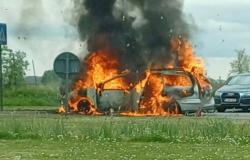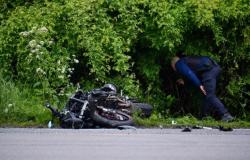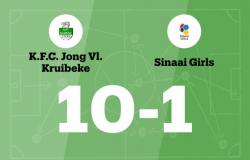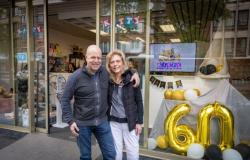Yana Andrivska (14) lived in Kherson during the Russian occupation. She now resides in Odessa.
Yana Andrivska is waiting for us outside the apartment block in Odessa where she temporarily lives with her mother and older brother. A girl with glasses, braces and baggy clothes. A teenager through and through. And a very tough girl, it soon turns out.
“When the war started I was 12. We lived on the left bank of Kherson, on a peninsula on the Djnepr called Ostriv. The Russians bombed us from day one, on February 24, 2022. Less than a week later, they captured all of Kherson.”
Ostriv was a nice place to live, says Andrivska. In the summer she went to the river every day with her friends, and she also went out every day with her camera. Until the war put an abrupt end to it.
“Our district was the first to be bombed. All around me I saw houses on fire. It was terribly scary, we couldn’t go outside. I was especially worried about my grandparents, who lived on the top floor of an apartment block. They were old and vulnerable, I didn’t want to think about anything happening to them.”
Kherson was occupied by the Russians for seven months, from March 2022 to November 2022. Andrivska says that she was very hungry all those months.
“Suddenly Russian food was for sale in the shops. But it wasn’t much, and besides, it wasn’t edible. I have lost weight, I remember that there was a great lack of food, especially in the summer. The only Ukrainian products that the Orks (the Russians, JDR) allowed into the store were vegetables. We ate them as much as possible. We also had almost no water and electricity, we were usually in the dark,” she says. But, “you get used to that”, it sounds cool.
“One night I was staying with my best friend. She lived on the tenth floor. On the only news channel we could receive, we heard that missiles had been launched. We went to the balcony and there we saw the rockets flying.”
She explains: “We made it a game: we had to guess whether they were really rockets or flares (a countermeasure that uses infrared to counter missile attacks, JDR). That’s what you get when you experience bombings every day. Eventually you get used to it. When I woke up at night by the sound of bombs, I always fell back asleep.”
‘Eventually you get used to the drone of the bombs’
Andrivska took online classes during the occupation. “The schools that cooperated with the Russians were open, but most remained closed. The high school where I went to school was also closed. The online classes were difficult to follow because we only had electricity very occasionally. But I still made it.”
When the Russians were finally driven out of Kherson, an aunt took Andrivska to Odessa. “I will never forget the first time I saw all that food in the shops. And the houses that were illuminated. It was fantastic, a paradise after the war in Kherson. Even if there is bombing in Odessa, the war has not gone away. But I’m not afraid of it at all, compared to Kherson, Odessa is a piece of cake.”
Ruvim Grigorchuk (8) lives in Kherson, where the Russians bomb every day.
Ruvim Grigorchuk lives with his parents and two brothers in a small house in Pavrisky, the family district, as it is known.
The city of 70,000 inhabitants is under fire from the Russians every day, and at least two people die every week. But life with three children goes on, says his mother Lubov. “They have to eat, take lessons. And in the meantime, hopefully they can still be a little child.”
There is no doubt about the latter when we see how Ruvim and his brothers Egor (6) and Semen (4) are causing a stir in their room. They run after each other, jump on their beds, in short, they are bursting with energy. “I miss school,” says Grigorchuk when he is finished and cuddles close to his mother. “We have online classes, but I miss my classmates, I can’t play with them.”
Lubov: “The children no longer come to each other’s homes to play. The less we take to the streets, the better. Because it is and remains dangerous. A daycare center for the children has been open for three months now, but we don’t go there. For the same reason: I want to go out on the streets with the children as little as possible.”
Yet he is not bored, Grigorchuk assures us. “I help my parents around the house, I watch cartoons and sometimes we play games.”
Together with his brothers, he even sleeps through the bombings, Lubov says. “They hear it every night, so yes, after a while you don’t care anymore. One day Ruvim was cycling around in front of the house. A rocket landed in our neighborhood but it just kept cycling, it didn’t budge.”
The family never fled. “We simply don’t have the money for it. But above all: we don’t want it. This is our home, our life. Despite the bombings, it is really doable to live here.”
‘Two Russian soldiers asked me if I wanted to hold a grenade. “Yes,” I said. I wasn’t afraid
Grigorchuk says that he has already met the Russians a few times (during the Russian occupation in 2022, JDR). “There were two soldiers at the door. One had a grenade hanging from his uniform. He asked if I wanted to hold it. “Yes,” I said. I wasn’t afraid. Then they laughed and left again.”
Lubov: “One day a Russian tank drove down the street, there were soldiers on it. Ruvim asked if he could go on the tank. It was very exciting for him, he didn’t see the danger. Now I never told my children about the atrocities of the Russians. Well, that they had taken our city and that this was not good. But they are still small and life in a city on the frontline is hard enough. I want to protect them somewhat from all the aggression around us.”
When we ask Grigorchuk at the end of our visit what he thinks about the Russians, he is silent for a moment. He then shrugs and says, “They’re people. Like us.” After which he runs after his brothers again with great enthusiasm.
Julia Zrozhevskaya (15) from Dnipro left for Belgium a month after the war.
“I was just a happy teenager in Dnipro. I went to school and had a lot of friends. In the afternoons after school I was always with my grandparents, they are like my second parents. My father and mother are divorced. I live with my mother, but I have a good relationship with my father. He has a terrible job: he is a forensic expert in a morgue where the dead soldiers lie.”
The day the war started, Julia Zrozhevskaya will never forget. “It was Thursday, my alarm was set for 7 am. But I woke up earlier because I heard my mother talking on the phone and packing things. When I went to look, I heard the most terrible sentence of my life: the war has started. I had to take a backpack and pack my most important things.”
Because it was not safe on her street, Zrozhevskaya stayed with her mother, brother and sister to sleep with friends, in a neighborhood far away from the barracks. “I remember well that my mother soon started helping to make Molotov cocktails, together with other parents. We, the children, stayed at home,” she says.
“We were watching TV when I heard the air raid siren for the first time. We ran to the basement, I thought my life was over. For the first time in my life I was really scared. We sat in that basement for two hours. Then luckily my mother came home. For the next few weeks, I slept in the basement every night. Together with my mother and five other women.”

Zrozhevskaya thought that the war would be over after a few weeks. When this turned out not to be the case after a month and the Russians had already advanced as far as Kherson, her mother decided to leave. “When we left for the station I saw my grandfather cry for the first time. I also had to cry, but I didn’t want them to see that because that would make them even sadder.”
Julia has now been living in Herentals for almost two years, together with her mother, her best friend and her friend’s mother. “The first year I took lessons in the OKAN class (reception class for foreign-speaking newcomers, JDR) to learn Dutch. Then I went to a normal school. I am now in the third year of secondary school where I am studying social and welfare sciences.”
She explains: “I’m the only Ukrainian in the class, but the others took care of me well. Fortunately, I don’t feel like a stranger. I have made new friends, but I go to school with other Ukrainian children every day. They are in different classes.”
‘Last summer we went back to Ukraine for the first time. I was very scared’
It sounds like she has built a whole new life here for which she is very grateful to Belgium. “I do street dancing and work in the kitchen of a restaurant at the weekend.”
She has no idea if and when she will return to Ukraine. “The war could last a long time, it is difficult to predict. But I miss Ukraine very much, it is and will always be my home. We went back for the first time last summer. And at Christmas too. There were many drones. I was very scared, my friends were not. They are used to it. While I can’t get used to it, just because I’m so far away.”
Mykhailo Klochko (13) fled with his parents from eastern Rubizhne just in time. Ten days later their house was bombed.
Mykhailo Klochko sits in front of the screen with his father Dmytro when we make a video call. The family lives in Herk-de-Stad. Dmytro (51) was able to flee Ukraine with his family in March 2022 because he is disabled and therefore did not have to stay to be called up for military service, he says.
The eldest daughter of the family is 18 and returned to Ukraine after a year to study. The other three children live in Belgium. “We come from Rubizhne,” says the father. “A city of 60,000 inhabitants in Luhansk Oblast. We have come a long way to Belgium.”
Mykhailo Klochko was 11 when the war broke out. It sounds like he was already playing a nice tune on the saxophone at that age. “I love the sax, I love the sound.”

The bombings in Rubizhne started on day one of the war. “We have a metal fence around our house,” he says. “At first I thought it was football hooligans banging on our fence. But they were bombs in the sky. When one of the houses on our street was bombed, my parents decided we had to leave. My youngest sisters were still a baby, my brother was 7.”
On March 4, 2022, the family was evacuated from the city by volunteers. Ten days later the family heard that their house had been bombed. “Our house, the garage, our car, there was nothing left.”
The Klochko family arrived in Belgium via Slovakia. They live in a small farm in Herk-de-Stad, a second home of a Belgian couple who stay somewhere else.
“I learned Dutch in primary school, together with seven other Ukrainian children. Now I am in my first year of high school. I speak Dutch fairly well, but I have a hard time with French lessons. My head sometimes explodes from all those languages.”
In his spare time he goes to the Chiro. He likes swimming and he plays basketball in Lummen, he says proudly. Although that is currently on hold because he has exams. “My life in Belgium is okay, but I think about the war every day.”
‘My life in Belgium is okay, but I think about the war every day’
Rubizhne has been occupied by the Russians, they can’t go back, Klochko realizes. “Not only is our house gone, all our friends have left too. That’s a strange idea, the life I had there will never come back. We don’t know where to go when the war is over. To be honest, I think it will take a while.”
And his saxophone? “I left it in Ukraine. We bought another one in Belgium, second hand. I take online lessons from my Ukrainian music teacher, the same one who used to teach me and now lives near Kiev. This way I remain somewhat connected to my home country.”
Tags: life Belgium war day Ukrainian children Russian occupation
-








